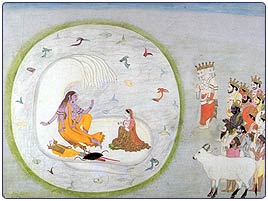Janmastami: A Timeless Celebration
By Lokkur Vasanthi Rao | Сен 05, 2007

All you need is love… when George Harrison sang these lines, wonder if he had been thinking about Lord Krishna! Krishna’s birthday is celebrated all over the world as Krishna Janmashtami, Krishna Jayanthi or Gokulashtami. No other deity’s birth is enveloped in such high drama.
The history
In 3327 BC, the year Vishwavasu, some believe a baby was born when the moon entered Vrishabha at the constellation of star Rohini to Vasudeva and Devaki. At the time — on the eighth day of the dark half of the moon in the month of Shravana—they were under house arrest surrounded by military guards of Kamsa, the brother of Devaki and evil son of King Ugrasena. It was Wednesday midnight and the place was Mathura.
The guards had been instructed to hand over every child born to the couple to Kamsa, as it was prophesised both by Narada and an astral voice that the eighth child would kill Kamsa.
He had the warning before that if he did not mend his cruel ways he would be killed by his nephew. Obviously Kamsa did not heed this and killed six babies. What happened to the seventh child is not really known.
Gokula, on the other side of Yamuna river, was where Nanda the chief of the cowherd tribe Yadava dynasty, lived. The eighth baby was Krishna, whose birth miraculously opened the prison gates and made way for Vasudeva carrying the baby to trek to Gokula and hand him over to Yashoda, wife of Nanda. Everybody was thrilled and they named him ‘Krishna’. He brings back their girl child and claims it as his eighth child. When Kamsa tries to kill it, the baby vanishes into the air and announces that Kamsa’s slayer is alive elsewhere.
The celebration
Krishna Janmashtami is a celebration by the devout and is preceded by fasting, which is broken at the time of His birth at 12 midnight. This is done with a lot of rejoicing, singing of bhajans and dancing.
This month Janmashtami will be celebrated on the midnight of September 4 and 5. The celebrations differ from one community to another and one region to another.
The puja includes even the smallest member of the family. Decorations begin early in the evening. The house and the portico are cleaned, rangoli drawn and small impressions of a baby’s feet are drawn in chalkpiece or a mix made with rice powder.
Women folk cook dishes which are believed to be liked by Krishna — beaten rice (sweet and spicy varieties), payasa, raveunde (sweet semolina balls), etc to be offered to Krishna for the naivedya. In some communities there is an elaborate preparation covering 56 varieties of snacks!
The fasts are broken a little past midnight after the aarti and offering fruits, milk and homemade sweets to the Lord. The offering includes butter, considered Krishna’s favourite and immortalised in folklore.
And entertainment follows, after all, Krishna is the lord of performing arts. To many, the universe was created when the sound issued forth from his flute. Better still, just pronouncing His name is musical enough, according to the Bhagawatha, which chronicles Puranic stories and talks a lot about Krishna’s enjoyable childhood.















